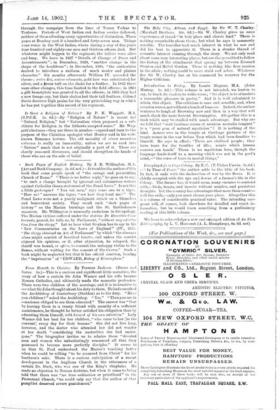• Dark, Pages of English History. By J. R. Willington,
M.A. (Art and Book Company. 2s. 6d. net.)—It troubles the author of this book that some people speak of "the savage and persecuting Church of Rome." "There is no better reply," he goes on to say, "to such a charge brought by ignorant and calumnious writers against Catholics than a statement of the Penal Laws." Is not this a little grotesque? "You eat men," says some one to a tiger. "How so ? " answers the tiger; "see how they hunt me !" The Penal Laws were not a purely malignant attack on a blameless and benevolent society. They recall such "dark pages of history" as the Marian burnings and the St. Bartholomew massacre. Mr. Willington is unusually audacious in his apology. The Marian victims suffered under the statute De Haeretico C am- burendo, passed, he tells us, by Parliament, "without any solicita- tion from the clergy." Let us hear what Stephen has to say in his "New Commentaries on the Laws of England" (IV., 215). "The clergy obtained an Act of Parliament" by which "the diocesan alone might convict of heretical tenets ; and unless the convict abjured his opinions, or if, after abjuration, he relapsed, the sheriff was bound, ex officio, to commit the unhappy victim to the flames, without waiting for the consent of the Crown." Such a book might be neglected but that it has official sanction, bearing the " imprimatur " of "EDWARD, Bishop of Birmingham."










































 Previous page
Previous page